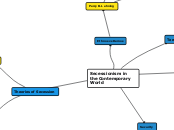Wojciechowski, 2007, pg.15
Sanchez, 2016, pg. 244
Separatists movements all aound
the world are causing mass migrations
and slowly leading to more terrorism
Butt relates security
and international law
Butt, 2017, pg 216
Butt, 2017, pg 217
"If the potential for external attack is what truly motivates decisions to react violently against secessionists, ameliorating such fears could translate to less violence and fewer deaths. The international community can tie the promise of security guarantees to good behavior in its dealings with the minority, as part of an explicit quid pro quo"
Butt, 2017, pg.215
Butt, 2017, pg. 216
Butt, 2017, pg. 215
"External security, drives whether, and how much, states coerce separatists"
similar thoughts
BREXIT
Butt, 2017, pg. 22
Kohen, 2006, pg. 93
"(...) the treatment of secession conflicts by the political UN organs seems to be characteristic only in respect to their anti-secessionist attitude concerning the eventual political resolution of such conflicts"
Kohen, 2006, pg. 67
"The reason why ethnicity cannot in itself be a basis for the composition of a state on individualist premises is quite simply that there is no necessary connection between descent, which is a matter of biology, and interest,which is a matter of the fulfilment of human needs and purposes."
Why can ethnos not be a
basis for community?
Lehning, 1998, p. 169
Kohen, 2006, pg. 5
Lehning,1998, pg. 7
Lehning, 1998, pg. 2
Lehning,1998, pg. 2
"The seceding group is taking a portion of the territory of the existing state, and it needs a very strong justification indeed for doing that; even the very great goods of cultural preservation and self-determination of a people are not strong enough reasons to justify this."
Communitarian
"(...) depends on the existence of a real community, not merely an imagined one. It is based on ‘civic nationalism’ "
Liberal political theory
Against
"(...) there is a restricted right to secede, as well as to cultural preservation"
Permissive
"If a group of people perceive themselves as having a distinct culture and traditions, and they are extensively predominant in a distinct territory, can they then justifiably secede from a nation-state in which they are embedded if they elect, by a democratic decision,"
"(...) there is a right of secession, indeed evena right of unilateral secession."
Pro-secessionists
"(...) who support it, subject to certain conditions"
Anti-secessionists
"(...) oppose the right to secession, except under certain conditions"
Perspectives
Approaches
Buchanan, 1997, p.34
Buchanan, 1997, p.35
"Different Primary Right Theories pick out different conditions that groups must satisfy to have a right to secede in the absence of injustices."
"Different Remedial Right Only Theories identify different injustices as warranting the remedy of secession."
"(...) assert that certain groups can have a (general) right to secede in the absence of any injustice."
"(...) assert that a group has a general right to secede if and only if it has suffered certain injustices, for which secession is the appropriate remedy of last resort."
Primary Rights Theory
Remedial Rights Theory
Allen Buchanan
Ethnos vs Demos
Percy B. Lehning
Demos
Terrorism
Claribel de Castro Sánchez
"The triad security/immigration/terrorism has now reached enormous significance after multiple terrorist attacks (...). After these attacks, the different positions on how to manage the refugee crisis in Europe have become more bitterly opposite."
Sebastian Wojciechowski
"Do individual factors influence terrorism in a different manner than fundamentalism or separatism?"
Secessionism in the Contemporary World
International Law
Global Policy
Marcelo G. Kohen
International Law 'Neutrality'
"The traditional view was that secessionist movements, when not under foreign control, were a purely internal affair."
External intervention
Intervention of other states
"Third States are bound by the principles of the non-use of force, non-intervention and self-determination when they contemplate intervening by force in a secession conflict. The most important legal distinction in this context is whether a State intervenes on the side of the recognized government of the State concerned or on the side of its opponents."
UN Intervention
Security
Ahsan I. Butt
Approaches to
conflict resolution
Coercion
"(...) when separatists become tied to external rivals of states, they become susceptible to pathological levels of violence, fueled by a sense of collective betrayal among both leaders and security forces."
Non-Intervention
"If intervention does arise in separatist disputes, it is unlikely to be aimed at the security of the minority at risk; rather likely to be precisely the type of intervention that intensifies violence".
"Outside intervention aimed at reducing violence has to walk a tightrope: it must be targeted at the state’s leaders, without giving the impression that it “sides” with the secessionists."
Security of Economy
What will be the economic conditions
of the old and new States?
"The ethnic group can freely use its state to extract resources from its population in the form of taxes as well as fashion certain economic policies such as industrialization, the construction of dams and irrigation canals, and targeted investment in certain sectors of the economy."
Theories of Secession

